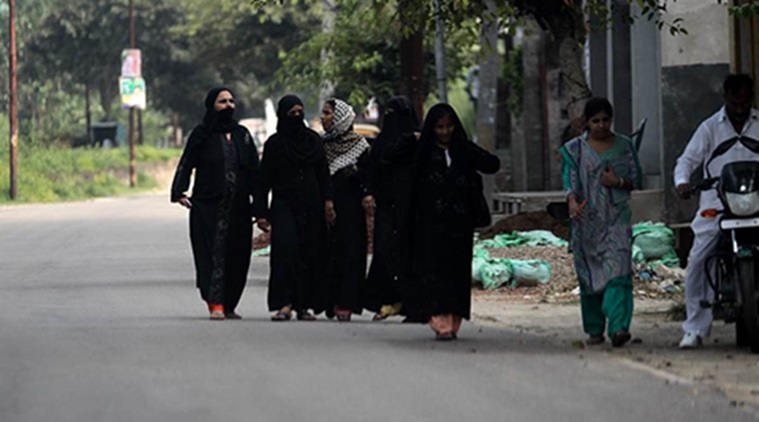View From The Right: Sharia courts
The editorial in Organiser questions the objectives and the timing of the All India Muslim Personal Law Board’s (AIMPLB) raising the issue of setting up Dar-ul-Qaza (sharia courts) in the country.
Updated: July 18, 2018 12:10:54 am

The editorial in Organiser claims that the moment negative reactions started coming in, Jammu and Kashmir’s deputy grand mufti, Nasir ul Islam, expressed the real intent and demanded a separate nation for Muslims if the demand for sharia courts in all districts of the country is not met.
The editorial in Organiser questions the objectives and the timing of the All India Muslim Personal Law Board’s (AIMPLB) raising the issue of setting up Dar-ul-Qaza (sharia courts) in the country. The editorial claims that the moment negative reactions started coming in, Jammu and Kashmir’s deputy grand mufti, Nasir ul Islam, expressed the real intent and demanded a separate nation for Muslims if the demand for sharia courts in all districts of the country is not met. The editorial claims that even the former vice-president, Hamid Ansari, joined the bandwagon by saying, “people are confusing social practices with legal system. Our law recognises that each community can have own rules. Personal law in India covers marriage, divorce, adoption and inheritance. Each community has a right to practice its own personal law”.
The editorial claims that organisations like the AIMPLB do not have any religious or legal sanctity, they are just like any other trust and therefore, cannot claim to be the voice of the entire Muslim population of the country. “What the Board is actually trying to do is to wage a third ‘clergy-war’— war against the eternal ethos of Bharat of ‘all ways to be true’ and impose the idea of ‘only my way can be true’,” the editorial argues. It adds that continuing with the legacy of Deoband, Aligarh, Nadwa, Ahl-e-Hadith, Jamaat-e-Ulema-Hind, Tabliq Jamaat and Jamaat-e-Islami, the fundamentalist clergies are again on the war path against Bharat. “Now with the decisive blow on their monopoly over the community in Shayara Bano case and losing battles in the ‘halala’ and ‘polygamy’ related cases, the call for Sharia courts is a desperate attempt to maintain the patriarchal power structure,” the editorial says.
The editorial further claims the religions that originated in Bharat had also developed some ill-practices like Sati or dowry which were legally banned with the adoption of the Constitution. So, justification in the name of customs or divine command does not hold any ground in the rule of law.” It says within three days of the AIMPLB announcing the plan for Sharia courts, one of the victims of triple talaq, Razia died at a hospital in Uttar Pradesh after a month of torture by her husband. “No more Razias” should be the clear stand of everyone who believes in the rule of law, Organiser argues and proposes a uniform civil code as the only solution.
AMU, reservations
Amid the ongoing debate over reservations in Aligarh Muslim University (AMU), Organiser has an article that blames the media for portraying Yogi Adityanath’s espousal of the “constitutional guarantees of scheduled castes and tribes in one of the universities in his state” as a communal demand. The article says that Adityanath’s intervention has brought to fore the need for “equitable implementation of affirmative action”.
Amid the ongoing debate over reservations in Aligarh Muslim University (AMU), Organiser has an article that blames the media for portraying Yogi Adityanath’s espousal of the “constitutional guarantees of scheduled castes and tribes in one of the universities in his state” as a communal demand. The article says that Adityanath’s intervention has brought to fore the need for “equitable implementation of affirmative action”.
The report calls for an evaluation of the role of religious minorities vis-a -vis affirmative action. “In view of the Constitution Bench judgment rendered in 1967 in the case of S Azeez Basha and Others Vs. Union of India (AIR 1968 SC 662), Aligarh Muslim University is… a central university, like any other university established under a central act. Therefore, it is now well-settled that AMU, like any other central university, belongs to Bharat and not to any particular community,” the report claims. “What if, for the reasons best known to them, and in the name of administrative autonomy, religious minorities argue that they do not want to implement reservations in the institutions administered by them? Then, all right-thinking persons of the nation have to pose a question — should such religious minorities be entitled to reservations in educational institutions and government jobs?” the report asks. It claims that the Constitution does not recognise extending reservations to the “so-called religious minorities”.
Target Rahul
An article in Panchjanya targets Congress president Rahul Gandhi, other politicians and several Bollywood actors for their alleged silence on the recent Mandsaur incident. The article says Rahul Gandhi used to tweet dozens of messages on even petty incidents but he is silent on the Mandsaur incident. The prominent people who divided the society by connecting the Kathua murder and rape with a temple and Hindutva were neither speaking on television nor active on twitter over the incident of the rape of a minor girl in Mandsaur, the article alleged.
An article in Panchjanya targets Congress president Rahul Gandhi, other politicians and several Bollywood actors for their alleged silence on the recent Mandsaur incident. The article says Rahul Gandhi used to tweet dozens of messages on even petty incidents but he is silent on the Mandsaur incident. The prominent people who divided the society by connecting the Kathua murder and rape with a temple and Hindutva were neither speaking on television nor active on twitter over the incident of the rape of a minor girl in Mandsaur, the article alleged.
Compiled by Lalmani Verma
For all the latest Opinion News, download Indian Express App






































No hay comentarios:
Publicar un comentario